HOW TO MOVE TO THE ALPS (AND MAKE IT WORK)
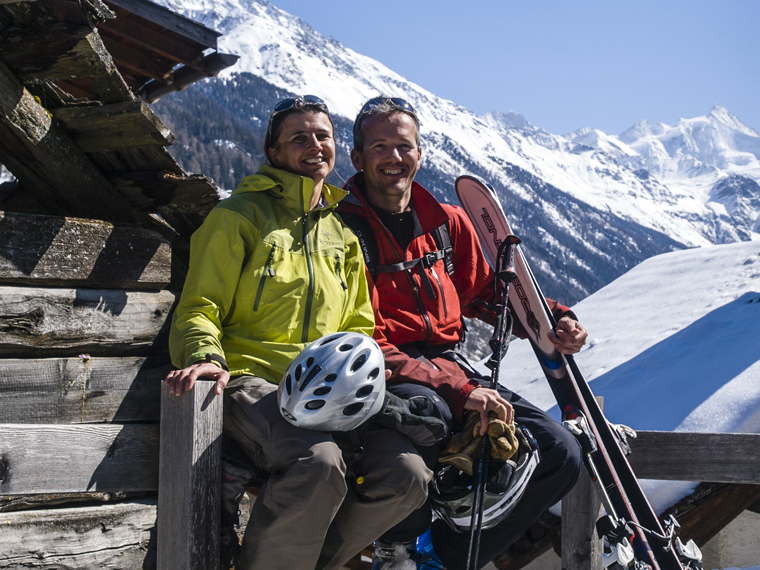

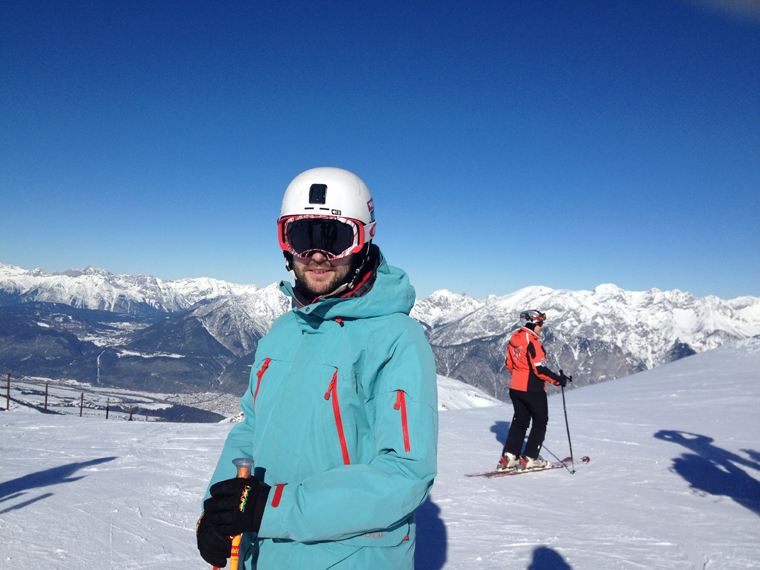
I moved full-time in June 2014 to Innsbruck, Austria.
I spent two ski seasons in Ischgl and loved the place. Opportunities for sports and activities are endless. I looked for jobs and was lucky enough to find a good one.
I knew the Innsbruck area roughly and had some German language, so I chose to live near Innsbruck. I found a shared house on Facebook close to the city, which was an ideal start.
I’m a design engineer for Prinoth Snowgroomers.
Yes, directly. I studied automotive engineering at Loughborough Uni so my degree was perfectly suited to my job.
I did German at school and university, but my ‘Tiroler Dialekt’ is still a work in progress… I work in the South Tirol, in Italy, where the main language is German, then Italian, then English. Many people there speak English, but I need German every day to speak to people who can’t, or when a discussion is in German.
I rent an apartment with my girlfriend in a village called Lans, just above Innsbruck on the south side. It’s small and cosy, with a big garage and a cellar for my sports equipment.
The rental market is competitive and can be expensive compared to the UK. Around Innsbruck, expect to pay at least €700 per month for a one-bedroomed flat with no garden. Property for sale is prohibitively expensive, mainly because the price of land is high.
I moved out here before the word Brexit existed, and everything was smooth and easy. You need to fill in a couple of forms at the town hall, but it’s not too testing. It helped knowing the language, but is also possible without. The trickiest part for me is the fact that I commute from Austria to Italy for work. Shared tax agreements can be confusing!
I haven’t found it too difficult to make friends. There are a few expats around and the locals are friendly. Innsbruck is a university town, so there are loads of students around, which can make it easier to make friends. My close friends are British, American and Austrian.
Good skiing. Cheap skiing. Lots of skiing. Night skiing. Weekend skiing. Mountain biking. Kitesurfing (yes – on lakes!). Snow kiting. Hiking. More skiing.
The high property prices, lower salary and distance to friends and family at home.
About six months in I felt I’d had enough and kinda wanted to go home, but I promised myself I’d stay for at least a year. I’m so glad I did! I’m really happy to call this place my home now.
Golden syrup, Branston pickle, real bacon, friends and family… in no particular order!
Oh, and above all else, the sea. I go back to the UK every few months, for weddings, Christmas and other occasions.
From October to May I ski every weekend… so around 60 days on snow.
Patscherkofel, a small local ski area, is 2km away. But about 30 ski resorts are within an hour’s drive from my door.
Try it! If you don’t like it, go home. Do it while we’re still in the EU!
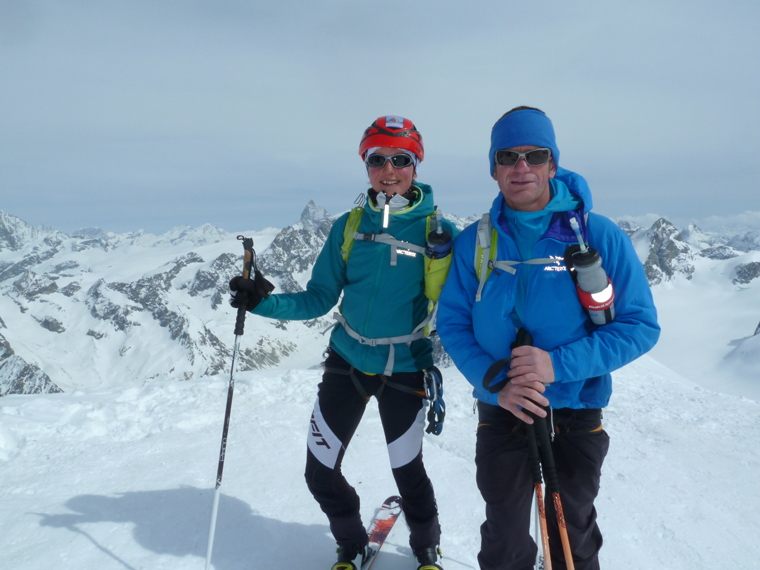
I moved to Evolène in the Swiss Valais in 2006 with my wife, Janine.
I’m a British Mountain Guide (IFMGA) and work summer and winter in the Alps. We decided to try living in the Alps rather than spending time apart.
Choosing where to live was more about finding a suitable house. We wanted to renovate an old chalet and I speak French, so we looked at places across the French-speaking Alps.
Yes. When we moved I was newly qualified and spent the first few years building up the business. We expanded in 2014 by buying Martin Moran’s summer alpine guiding business.
I already spoke reasonable French when we moved (university French degree and several seasons in Chamonix). In some resorts (like Chamonix) you can get by in English, but if you want to live here, get to know locals, and deal with schools and administration, speaking the language is essential. Helping kids with homework in a foreign language is challenging!
We sold up in Britain and bought an old chalet that took us a year to renovate. At the time the UK property market was strong and the sterling/Swiss franc exchange rate was good. Since then the pound has lost 50% of its value so we couldn’t afford to make the move today. Likewise, with the current weak pound, renting could be expensive.
To move to Switzerland there’s Swiss residency, tax, pensions (protect your UK pension fund if you have one), driving licence, car registration and insurance, health care, right to vote in the UK, and so on… It can appear daunting, but if you really want to live abroad then it is possible.
Making friends and getting on with the locals takes time – in French-speaking Switzerland people are slow to make friends. Speaking the language, having children at school and making an effort to integrate helps a lot. There aren’t many British expats here in Evolène, although there are a few non-Swiss families in the valley.
The excellent weather, beautiful environment and great views. Switzerland is a fantastic place to live with a high standard of living. It’s not cheap, but everything works and is reliable.
Visiting family is harder, especially with ageing parents. It gets harder for them to travel here, and school holidays, work schedule and cost make it hard to spend much time visiting them.
Simple things like British rock climbing and the pub culture. Don’t underestimate the good things about the UK – I know a lot of people who, after a few years, have moved back to be closer to family and friends.
I ski 100-plus days a season but then I work as a guide. Skiing makes up most of my winter work – I ski maybe 10 days a year for pleasure.
A five-minute drive, but there’s a huge amount of ski touring here too (from the front door in good conditions), which is my favourite skiing.
Think carefully and get plenty of advice. If you still want to, go for it. It’s great to try, even if after a few years you decide it’s not for you. Many of the frustrations of daily life in the UK still exist abroad, but in a foreign language! Get advice on the technical paperwork. The current weak pound means property is expensive, and current British politics aren’t going to make it easier for Brits to live abroad in future.

July 2007, to Val d’Anniviers in Switzerland.
We spent a lot of each winter on the road, mainly in the Alps, and found we wanted to ski more each year, with a permanent base.
An Engelberg-born guide based in Andermatt told us we had to visit the Val d’Anniviers – it’s where he goes when he wants powder and great terrain without crowds. From someone with that pedigree, it had to be worth a look. A few seasons later we made our first visit and the season after that we were house-hunting.
We started a new winter business, running a chalet, mostly aimed at hosting guided off-piste groups. We both had a lot of experience of being on the receiving end of alpine hospitality. Knowing what we liked and disliked was the basis of how we set up our chalet, how we run it, and the kind of skiers we aim to attract. Penny had experience of hosting a chalet; I had watched Fawlty Towers! In summer we write and photograph for newspapers and magazines as well as working for Inntravel, exploring routes for their walking programme.
I speak French and German – I had lessons before moving; Penny has some French and has taken a few lessons. Having an almost 100% English-speaking clientele makes it tricky to improve during winter, but we need French for daily life and business administration, and particularly with friends and neighbours.
We own the building we run as a chalet as well as a tiny chalet opposite, which is our winter home. In summer (when we have friends rather than paying guests to stay), we move into the main chalet and rent out the smaller one self-catered. Buying is quite simple, though the local market is slow and it’s tough to drive a bargain. A place in Zinal has been on the market since before we arrived and the price goes up each year in line with inflation!
It was pretty straightforward, though initially the paperwork was daunting as it all comes at once. A big hurdle was passing the accountancy and legal exams needed to run a chalet.
The valley has just 2000 inhabitants, so it’s a small community. In some ways it’s easier for us to come from another country rather than a few miles out of the valley – anything weird we do is put down to cultural differences. Everyone was friendly, and nosey (they can’t believe you’d come from London to live here). People saw us working on the old auberge we had bought and apart from thinking us mad, had respect for the effort we put in.
The majority are Swiss (most born in the valley); there are also Dutch, Belgians and Brits.
Very, though a little puzzled.
All kinds of weather are good: a storm in winter = powder; the same in summer is spectacular, it tops up the glaciers and makes the waterfalls look amazing; misty autumn weather is magical. Summer is wonderful, and though we came for the snow, the rest of the year almost tops it.
It would be great to teleport to and fro to keep up with family and friends.
Three or four days a week; our season runs from mid-November to late April, after which we ski tour. There’s a ski bus from our door to the lift five minutes away.
European politics and the financial situation are tricky, but that shouldn’t stop you if you really want it and have a good plan.
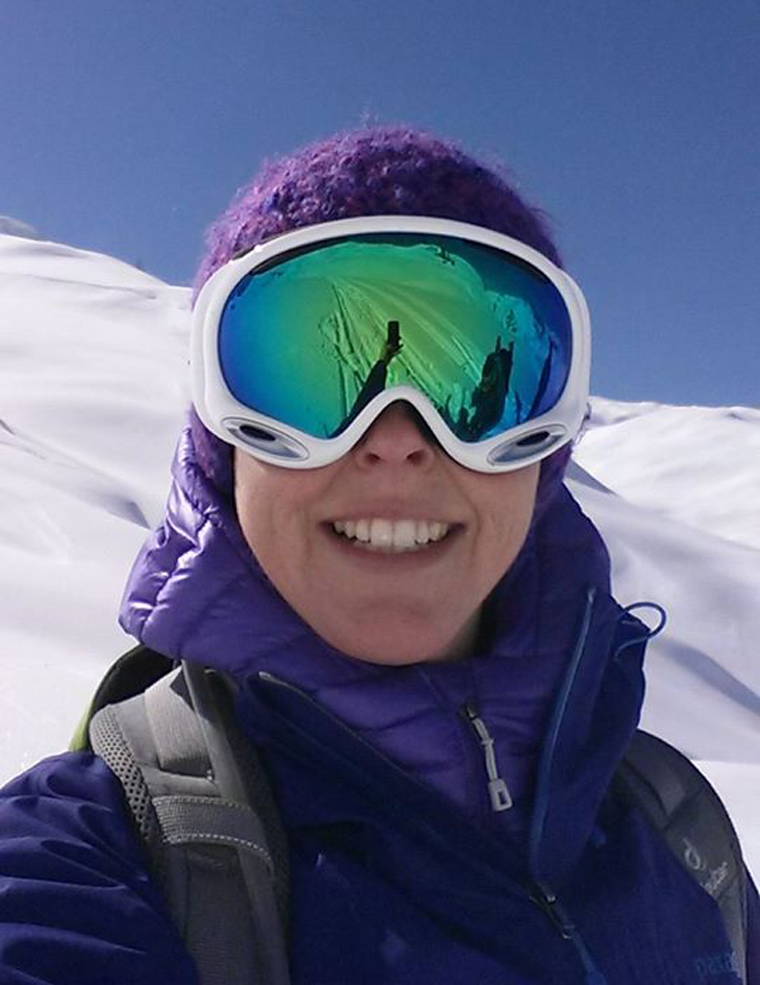
In 2004, with my husband, to Chamonix.
We’d done a few seasons, been travelling, got ‘proper’ jobs, but kept coming back to the Alps. So, after getting married, we thought we’d sell up in the UK and give it a go permanently.
I was offered a chalet job in Chamonix for the first winter. Later, I discovered my original employer in the UK had a large accountancy office here and, as I was already a qualified accountant, it meant I could pursue my career and earn better money.
As I work for a UK company that has an office here, it was simple to transfer my skills. Technically I would need to take qualifications to practise as a fully-fledged French accountant, but plenty of Brits in my situation work in the industry.
My French is still a bit ropey! I have taken lessons and speak it daily, but most of my working day is spent speaking English.
We own a flat here, which was straightforward to buy. We earn euros and are on French employment contracts, which makes it simpler.
For us, as part of the EU, there was none. Who knows what may change in light of Brexit, but currently we are eligible to apply for French residency or even citizenship.
The French and British socialise differently, which affects integration for those that don’t have kids. Having kids tends to increase your level of integration. We have French friends and neighbours, and the locals are welcoming, but there is a large expat community here of Brits, Swedes and Americans, which forms the main part of our friendship group.
Access to the great outdoors, year-round. The longer I’m here, the more I love it, as much in the summer as I do in the winter. And the food and wine is amazing. The downsides? French bureaucracy, lunchtime shop closures and high property prices. There are challenges for my husband who runs his own business making things out of wood and renovating properties – they don’t reward the entrepreneurial spirit here.
Friends and family, fish and chips and Boots the chemist. It drives me mad having to go to a pharmacy for paracetamol! I get back every few months to visit friends, family and for work.
Not enough! Around 30 days a year, and a few early morning ski tours before work. My nearest lift is five minutes by bus or car.
Be prepared to take a pay cut and to work your way up, or even work in a job you wouldn’t consider in the UK to get established. Opportunities spring up when you least expect them and networking is important. Jobs where accommodation is included makes the process far easier. Most of all, just do it! What have you got to lose?
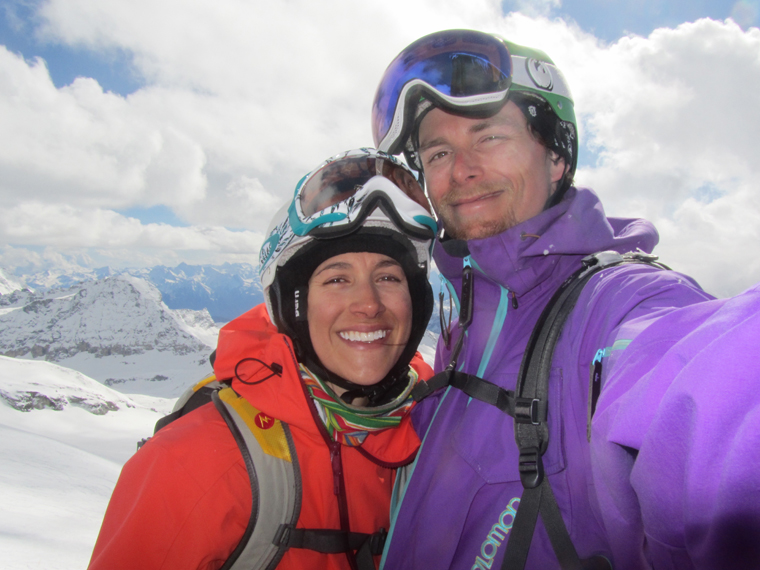
Nicola and I moved in 2013 to Morzine in France.
We felt as though it made more sense to go and live where we enjoyed holidaying so much.
We had a list of criteria largely based on ‘livability’. So, questions we asked ourselves were: is there enough going on year-round? Is it pretty? We had been to Morzine previously and loved it. We also had friends there already.
I’m a brewer and was working as such in London largely as a consequence of having the dream to make beer in the Alps one day. Fortunately, there were no other breweries in Morzine at the time so we filled a vacuum really, and opened the Bec Jaune Brewery in December 2013. Nicola was freelance writing and working remotely for Fall-Line, so moving didn’t affect her work – it just made gear testing a lot easier!
I had studied French through school and then in university, so after 10 years of not using it at all living in London, suddenly it came in handy. I speak it every day, whether it’s conversing with our son’s care-workers or customers at the brewery.
For the first year we rented out our apartment in the UK and used the proceeds to lease a flat out here. There’s a good supply of yearly rentals in Morzine, though they get snapped up fast, so it’s best to start looking before you move (we learnt this the hard way). We were constantly looking for a place we could buy and, in autumn 2014, we found it. We sold our London flat and bought a house 10 minutes down the valley in St Jean d’Aulps, benefitting from the difference in London prices to the rest of the world.
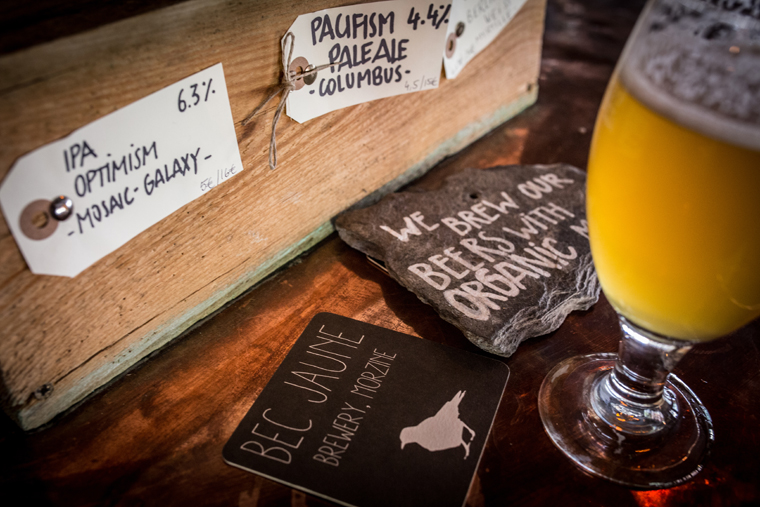
Getting on the French social security system took a good deal of time, paperwork and patience, but generally things have been smooth. This is where speaking French comes in handy. There are plenty of people living here who are in different stages of the transition and who can offer advice.
We feel more at home in the mountains than we ever did in the city. Suddenly we were surrounded by like-minded people and it wasn’t long before we had a network of good friends – Brits primarily, but also French, Kiwis, Czechs… The local population have to deal with an inordinate amount of non-French speaking people who compete with their business and buy their property. In the light of that, I’d say the locals here are supportive and friendly, especially if you respect and appreciate their culture.
The obvious things: the mountains, sports, like-minded people, good cheese. Obviously there is less diversity than in a major cosmopolitan area, so sometimes you feel like you need to get out and see how the rest of the world is ticking along. But then it isn’t long until you can’t wait to get back!
I miss old spit and sawdust pubs with great beer, but, in fairness, they’re a dying breed in the UK too. We go back once a year.
We can see the Roc d’Enfer gondola from our house – it’s a three-minute ride by bus or car. We ski whenever we can, but we have a growing family and work, so often it’s a few hours here and there, rather than full days. The good part is feeling you don’t need to stress and rush out and get it, like you often do on holiday.
You only live once. Go for it.
Seasonnaire Secrets: what packing tips do you have for first time seasonnaires?
Vol. 1: The diary of a skiing medical rescue elective in New Zealand